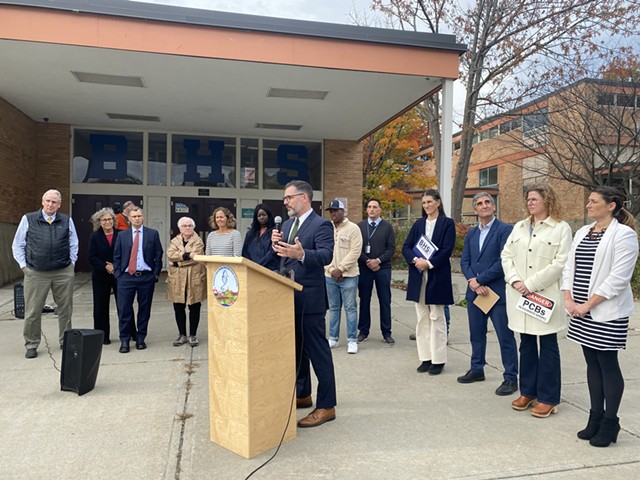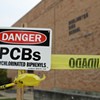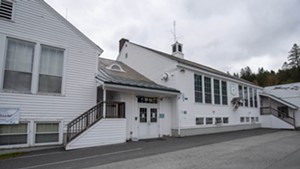
- Alison Novak ©️ Seven Days
- Burlington superintendent Tom Flanagan at an October press conference about PCBs
In a lawsuit filed on Friday in federal court in Burlington, the district alleges that Monsanto encouraged customers to use PCB mixtures in construction materials "despite knowing that this would directly introduce PCBs into surrounding air and other construction materials, and onto nearby interior surfaces."
Discovery of elevated levels of airborne PCBs at the high school in 2020 prompted district officials to relocate classes to a converted Macy's department store. They then cited the high cost of remediation in successfully seeking voter approval last month to construct a new, $165 million high school and tech center on the same campus.
Related Burlington School District Plans to Sue Monsanto Over PCB Contamination

Burlington School District Plans to Sue Monsanto Over PCB Contamination
Environment
“Today’s filing brings us one step closer to holding the producer of these toxic chemicals accountable for the harm it has inflicted on our community,” superintendent Tom Flanagan said in a press release.
Two former BHS educators separately sued Monsanto in October. They claim workplace exposure to PCBs led to serious health problems, including reproductive issues and hyperthyroidism.
Related Burlington Educators Sue Monsanto Over PCB Contamination at High School

Burlington Educators Sue Monsanto Over PCB Contamination at High School
News
The company has paid hundreds of millions in trial verdicts related to PCB contamination in buildings and groundwater, though some cases brought by school districts in other states have not been successful.
The BSD complaint lists six legal claims, including public and private nuisance, defective design, failure to warn, trespass, and negligence.
In a statement on Monday, Monsanto blasted the lawsuit and suggested the district and state bore responsibility for the calamity that is disrupting education for thousands of students. Following PCB testing at Burlington High School, the Vermont Department of Health relaxed state standards on hazardous PCB levels.
“This lawsuit has no merit," the company's statement begins, "but hopefully it will shed light on the role of the state of Vermont, the Burlington School District and the manufacturers of the building products at issue in creating the perfect storm that resulted in unwarranted actions to abandon the school, move students to a converted Macy’s, cancel renovation plans and spend $165 million, more than twice the renovation cost, to build a new high school — actions that could have been avoided.”
Read the complaint here:














Comments
Comments are closed.
From 2014-2020, Seven Days allowed readers to comment on all stories posted on our website. While we've appreciated the suggestions and insights, right now Seven Days is prioritizing our core mission — producing high-quality, responsible local journalism — over moderating online debates between readers.
To criticize, correct or praise our reporting, please send us a letter to the editor or send us a tip. We’ll check it out and report the results.
Online comments may return when we have better tech tools for managing them. Thanks for reading.